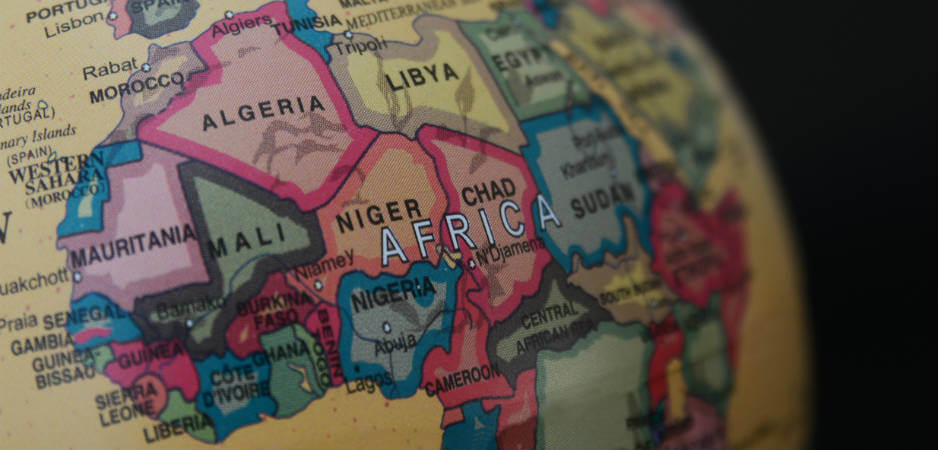Mali’s inability to improve its security conditions means that it is likely to remain a key base for al-Qaeda’s activism in the region.
On March 2, 2017, leaders of several Mali-based terrorist factions linked to al-Qaeda released a video statement announcing the creation of a new organization via the merging of their groups.
In the video statement, the Ansar al-Dine leader Iyad Ag Ghaly (seen below sitting in the middle of a panel of local militant leaders) states that the new faction is to be named Jama’at Nusrat al-Islam wal-Muslimin (The Support Group for Islam and the Muslims, or JNIM), and would bring his own group into a single formal entity with the Greater Sahara Brigade (GSB), al-Mourabitoun and the Macina Brigade.
The statement was released via a Telegram account titled al-Zaleqa Media Production, set to be the official propaganda outlet for the new organization.
Appearing alongside Ag Ghaly in the video are the senior militant leaders Yahya Abu al-Hamam (emir of the GSB), Ahmadou Kouffa (emir of the Macina Brigades), al-Hasan al-Ansari (deputy emir of al-Mourabitoun), and Abu Abderrahman al-Sinhaji (a senior cleric in the Greater Sahara Brigades). It appears that these figures are to be the operational commanders of the new group, and Ag Ghaly the regional emir.
As Ag Ghaly specifies in his statement, the organization will remain loyal to the higher leadership of al-Qaeda in the Islamic Maghreb (AQIM) leader Abdel Malek Droukdel (aka Abu Musab Abdel Wudud), as well as al-Qaeda central leader Ayman al-Zawahiri and Taliban leader Mullah Haibatullah. As the Long War Journal has highlighted this week, this pyramidal system of emirs (commanders) is characteristic of how al-Qaeda’s international organization is structured.
Interestingly, the veteran Algerian jihadist Mokhtar Belmokhtar does not feature in the statement, despite being the nominal leader of al-Mourabitoun. This is a potential indication that Belmokhtar is either severely incapacitated in his hideout in Libya (as has been recently rumored) or perhaps has already died. Although al-Mourabitoun named Belmokhtar as its official emir in August 2015, the group has released no concrete proof that he still alive (such as an audio or video recording) following two unconfirmed reports of him being killed in airstrikes in Libya since 2015.
More Mature and Effective
The formation of JNIM is the latest development in a trend going back to late 2015, which has seen al-Qaeda-linked groups in Mali becoming more cohesive and coordinated. For several years previously, the group’s senior figures and associates had been fairly disparate and in some cases conflicted, with leaders such as Belmoktar splitting from the leadership of Abdel Malek Droukdel and forming separate groups.
Since 2015, however, these splintered factions have been steadily regrouping, with Belmokhtar’s group officially rejoining AQIM in December 2015, and operational coordination in Mali between AQIM and Ansar al-Dine increasing during 2016.
 These shifts reflect a growing maturity and confidence among al-Qaeda’s regional affiliates as their factions consolidate their influence within Mali. Over the past few years, AQIM has been increasingly pushed out of its historic homeland of Algeria, as the government has sought to boost securitization following Belmokhtar’s attack on the In Amenas gas complex in January 2013.
These shifts reflect a growing maturity and confidence among al-Qaeda’s regional affiliates as their factions consolidate their influence within Mali. Over the past few years, AQIM has been increasingly pushed out of its historic homeland of Algeria, as the government has sought to boost securitization following Belmokhtar’s attack on the In Amenas gas complex in January 2013.
Mali, meanwhile, suffers from a chronic dearth of security resourcing as well as numerous ethic-political divisions, and so has proven an ideal new base for terrorist factions. This has allowed al-Qaeda affiliates a large amount of room to maneuver and strategically develop, which resulted in a large increase in the number and complexity of attacks in Mali last year compared with 2015.
With the formation of JNIM, this recent trajectory of terrorist activity in Mali can be expected to continue, with the potential for a further increase in attacks in the country and nearby regions in 2017. It can also be anticipated that the tactics and complexity of al-Qaeda operations may further develop, involving more of the ambitious and multi-phased assaults on Malian and UN security positions that were seen increasingly in 2016.
Ultimately, terrorists are attracted to and thrive in regions where there is a governance vacuum, and the lack of prospects for Mali to fundamentally improve its security conditions means that its territory is likely to remain a key base for al-Qaeda’s activism for the foreseeable future.
Expanding Networks
Though there is a chance that JNIM may attempt to launch a cross-border incursion into Algeria—as AQIM did in March 2016, when it fired several long-range rockets into the Krechba gas facility in Ghardaia province—the Algerian government’s higher level of border security is likely to encourage the group to remain primarily focused on more southern, less securitized regions.
The merger could also bolster AQIM’s long-term presence in Mali by widening its recruitment capability. Over the past decade, al-Qaeda’s strategy across multiple regions has involved attempts to integrate into local communities and curry favor with regional populations, with the aim of enabling the group’s affiliates to become accepted as legitimate political actors. This is also likely to continue to be a key focus of JNIM, with al-Qaeda now having expanded its formal network in Mali.
The name chosen by the new group reflects these efforts toward local outreach, by attempting to make the organization appear broadly appealing to Muslim populations in the region. The name is similar to that originally given to al-Qaeda’s affiliate in Syria (Jabhat al-Nusra, or the Support Front), and is reminiscent of language typically used by al-Qaeda branches in propaganda releases that tend to claim that the group’s role is to protect Islam and Muslims from foreign imperialism and secularism.
Over the past decade, al-Qaeda’s international activists have often pursued a strategy of distancing the movement’s global jihadist project from local community engagement efforts, with the latter often being pursued through regionally connected front groups without an explicit link to the central organization. Ansar al-Dine and the Macina Brigade were examples of such groups that allowed al-Qaeda to cultivate local alliances with ethnic Fulanis in Mali’s central regions.
One reason that al-Qaeda chose to do this, as highlighted in correspondence between its international leaders, was to shield the group from large-scale counterterrorism operations, such as those carried out by the US and its local partners, while becoming progressively more active in particular regions.
The fact that AQIM-linked groups have now decided to form a single organization in Mali, with an explicit and public pledge of allegiance to Droukdel and al-Zawahiri, is likely to be a further reflection of the increased level of confidence which the groups enjoy in the region as a result of Mali’s long-term security vacuum.
*[This article is based upon a report by PGI.]
The views expressed in this article are the author’s own and do not necessarily reflect Fair Observer’s editorial policy.
Photo Credit: oztasbc
Support Fair Observer
We rely on your support for our independence, diversity and quality.
For more than 10 years, Fair Observer has been free, fair and independent. No billionaire owns us, no advertisers control us. We are a reader-supported nonprofit. Unlike many other publications, we keep our content free for readers regardless of where they live or whether they can afford to pay. We have no paywalls and no ads.
In the post-truth era of fake news, echo chambers and filter bubbles, we publish a plurality of perspectives from around the world. Anyone can publish with us, but everyone goes through a rigorous editorial process. So, you get fact-checked, well-reasoned content instead of noise.
We publish 2,500+ voices from 90+ countries. We also conduct education and training programs
on subjects ranging from digital media and journalism to writing and critical thinking. This
doesn’t come cheap. Servers, editors, trainers and web developers cost
money.
Please consider supporting us on a regular basis as a recurring donor or a
sustaining member.
Will you support FO’s journalism?
We rely on your support for our independence, diversity and quality.







